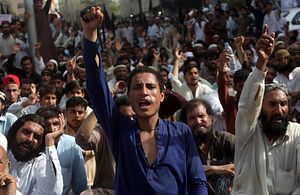After weeks of defiant protests, Pakistan’s Pakhtun Tahaffuz Movement (PTM) has highlighted the plight of the people living in the Federally Administrated Tribal Areas (FATA) and gained the military’s attention.
On Tuesday, the Peshawar corps commander, Lt General Nazir Ahmad Butt, in a statement said that PTM’s “demands are genuine and we are ready to address all demands within the purview of the Constitution.”
The military’s decision to hold a dialogue with the PTM, which was previously termed an “engineered movement,” supported by Pakistan’s foes, is certainly surprising. While the choice of a dialogue is a prudent approach considering the movement’s demands fall in the ambit of the country’s constitution, it remains unclear why Pakistan’s powerful military has decided to enter a dialogue with the group at this point.
If Pakistan’s political history is any guide, any ethnic and nationalist movement directly challenging the military or its approach to the domestic and foreign policy of Pakistan have either been silenced with force or have been tamed into accepting the status quo.
The PTM’s entire agenda is focused on demanding that the military give up its heavy-handed approach toward managing the country’s tribal areas. The movement has accused the military of supporting militant groups and abducting and silencing anyone who attempts to make public the former’s approach to managing FATA through a militaristic policy.
Certainly, the Pakistani military is not pleased with young Pashtuns calling out the military for its disputed policy to manage FATA.
The military’s annoyance with the movement is evident through the absolute censorship of the Pakistani media: almost all TV channels and newspapers in Pakistan have been barred from reporting on the issue. Moreover, universities in the country have also been pressured into canceling events that would in any way offer legitimacy to the movement’s narrative. A number of activists belonging to the movement have also reportedly been abducted, harassed, and forced to go into hiding.
Apparently, the state’s heavy-handed approach to dealing with the movement has backfired. Last Sunday, the PTM’s planned rally in Lahore couldn’t get permission from the provincial government.
Despite threats, the PTM’s rally in Lahore was attended by thousands of people that called on the state to end its policy of enforced disappearances, extrajudicial killings, and other alleged rights abuses. The movement’s struggle has received an immense international support and media coverage, putting pressure on the state’s policy to reject the young Pashtun activists’ struggle to obtain basic human rights, which are promised to them per the country’s constitution.
It’s unlikely that the military’s decision to hold dialogue with the PTM is a decision that willingly recognizes the latter’s plight. Rather, it appears to be a decision borne out of a recognition of the growing popularity of the movement and international pressure.
The state’s decision to engage PTM appears ultimately to be motivated by the country’s political circumstances. Any attempts on the state’s behalf to contain a movement that has resonated all across Pakistan, particularly at the grassroots levels, would only add to the legitimacy of the struggle.
However, none of this means that the PTM’s demands will be addressed in their entirety with a robust change in policy.
While it remains to be seen how far the military is willing to go to tolerate the PTM’s growing popularity in the country, the group’s constitutional demands come at a time when space for civilian forces in Pakistan is being isolated.
The ruling party’s leadership which also faces pressure from the military establishment has offered its support for the movement’s right to hold rallies across Pakistan. Moreover, the chairman of the Pakistan People’s Party, in a statement, said that “All Pakistani citizens have right to peaceful protest. PTM are no different.”
If Pakistan is to become a state in which everyone is accountable before the law, the movement’s agenda, which remains in the ambit of the country’s constitution, should be supported by all mainstream political parties in the country. Self-censorship and compromising the rule of law at the expanse of narrow institutional interests won’t make Pakistan a democratic state.

































